I. WHEN DO WE USE THIRD CONDITIONAL CLAUSES?
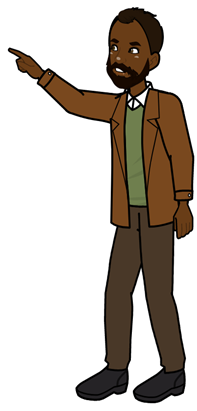
- We use third conditional to express that we would like to change something in the past and have different consequences, but it is impossible.
- It is common to use third conditional to express regret and sadness.
- We can also use third conditional to talk about things in the past that could have been different, for better or for worse.
- It is like saying they are utopian situations in the past.
- About format, if the IF-CLAUSE comes first, it´s necessary to add commas.
1.1 About its structure, look at this chart:
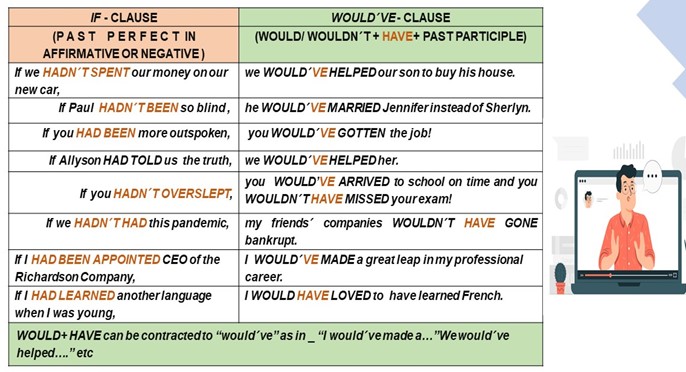
1.2 Remember you can change the order of the clauses and the meaning will remain the same. If the WOULD’VE-CLAUSE comes first, it´s not necessary to add the comma.
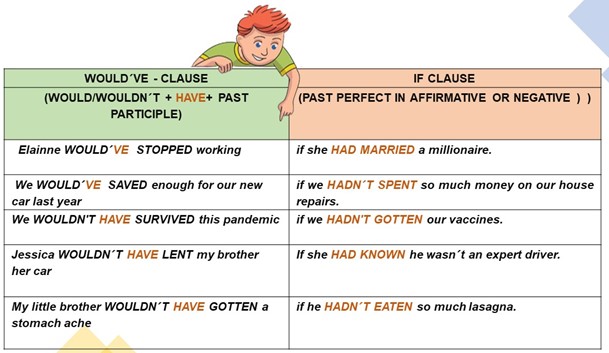
Here are a few more examples:
QUESTIONS
- Would you have gotten along with your wife if you had known her better when you were dating?
- What would have been different for you if you had been born a boy/a girl?
- Would you have asked for different toys at Christmas if you hadn´t received the ones you did?
AFFIRMATIVE SENTENCES _ IF- CLAUSE comes first (commas)
- If I had had other brothers and sisters, I would have played a lot with them.
- If I had kept in touch with my friends from high school, maybe we would have met many times up to now.
AFFIRMATIVE SENTENCES _ WOULD´VE CLAUSE comes first( no commas necessary)
- I would have loved to learn Japanese or German if I had learned other foreign languages when I was younger.
- Growing up would have been easier if my parents had learned about emotional intelligence before.
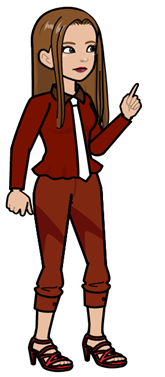
IMAGE 3 NEGATIVE SENTENCES _ IF- CLAUSE comes first (commas)
- If my children hadn't played in the ground as kids, they would have gotten many allergies.
- If our parents hadn't let us watch cartoons on TV, we wouldn't have known many of the characters we like today.
-
NEGATIVE SENTENCES _ WOULD´VE CLAUSE comes first( no commas necessary)
- My sister wouldn't have become a professional dancer if our parents hadn't supported her dreams of learning how to dance ballet.
- Our students couldn't have attended the Spelling Bee Event in Oklahoma if we hadn't received enough funds.
1.3 CONTRACTIONS
When we use third conditional, we can use “contractions" in both clauses.
would've = contraction for “would - have”
'd = contraction for “had” in past perfect
- My sister would´ve studied criminology if my parents´d let her.
- I wouldn't have met my wife if I'd studied in another college.
II. CONSOLIDATION.
NOW TRY THE FOLLOWING QUIZ. Choose the correct answer to complete the following sentences correctly
III. EXERCISE I
LANGUAGE USE PRACTICE
THIRD CONDITIONAL
VI. READING COMPREHENSION AND VOCABULARY BUILDING
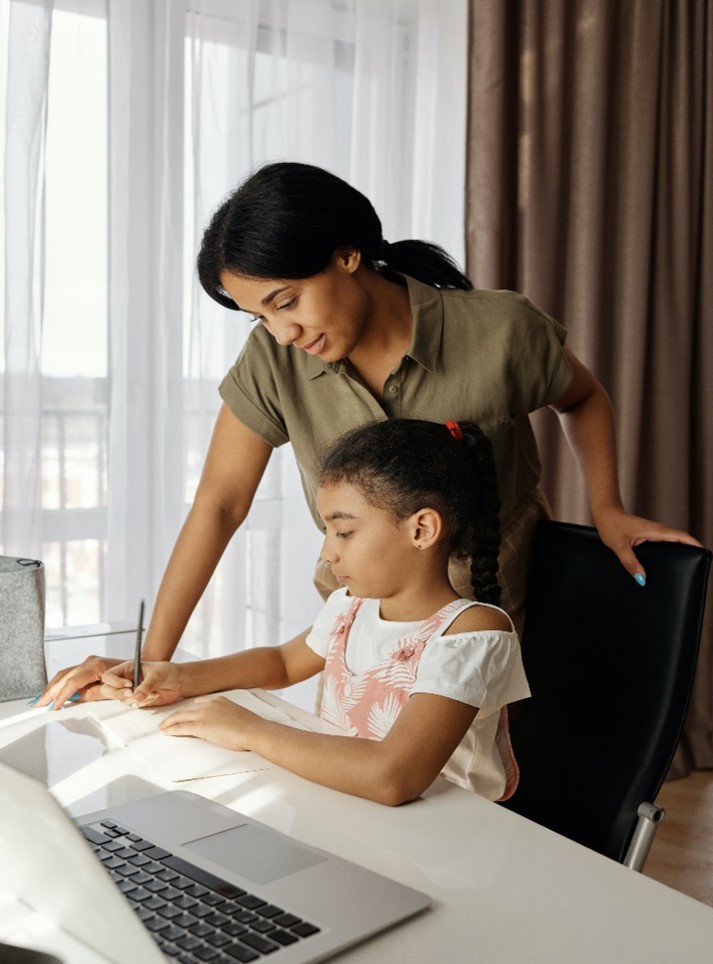
If I had been able to talk to my 8-year-old self…
(I) Do you ever think about your childhood and how some things you held a high regard for then, really don’t matter now? I do. In fact, I wish I could tell the 8-year-old me some things that could have helped me avoid or better navigate some of the difficult times.
(II)I was recently having a conversation with my daughter about a situation that was really stressing her out. While trying to listen attentively with compassion, I was thinking to myself, “wow, you are stressed about this little ole thing?” Rather than give that thought a voice, I expressed to her how I understood why this seemed so important to her right now. I asked her what was the worst thing that could happen and why it mattered so much to her. Talking through this made her realize that it wasn’t as big a deal as she had built it up to be in her mind. I encouraged her to focus on the outcome she desired, the things she could actually take action on to achieve that, and possibly even improve her current situation.
(III)I reflected with her on an example of a problem I had in my childhood. We both roared with laughter because it was silly, especially hearing myself say it out loud. The point was this problem had me wanting to run away from home when I was 10 years old because of how important it was to me at the time. In that moment I thought to myself, “Elonda… knowing what you’ve learned up until this point in life, what would you tell yourself back then?” I wanted to share some of those thoughts with you here:
- Be yourself. There is a time and a place for everything; however, if you have to do things you’re uncomfortable with in order to fit in- don’t! You’re a master piece, just you’re trying to fit into the wrong puzzle.
- Fall in love with you first. Some could call this selfish, but the way you treat people is a direct reflection of how you feel about yourself. If you love yourself truly, flaws and all… it makes it so much easier to care for and love others while with the right intentions.
- You’re beautiful just the way you are. If you’re unhappy with something, love it for making you who you are. If it is something you’d really like to change and you can… do it! If it’s something you love but others don’t, love it more!
- Compete with your best self daily. Healthy motivation is great, when you are leading by example and inspiring others around you to be their BEST self as well. Don’t compete with others’ best. Their dream is not your dream and you will inevitably find yourself on the wrong path.
- Smile even when you’re sad. It makes you feel better.
- Know that it always gets better. Trouble and problems will come but they do not last forever. It’s OK to not be OK sometimes. Acknowledge it and reach out for support if needed. Just don’t stay in that space too long without anyone knowing.
- Live for the experience, not the material things. Materials will come along but seek first enjoyment of life. This means you must identify what makes you happy. Material things only create temporary happiness if any at all.
- Seek understanding in life experiences and people. You will endure some hardships. Rather than ask, “why me?” look to understand the purpose and lesson in what is happening. What did you get or who did you meet as a result of this experience? And how has it changed your life?
- Let people know when they’ve hurt you rather than keep it to yourself. It’s more likely than not that they didn’t mean to hurt you at all.
- Empower others to help themselves rather than just being the help. When someone is consistently seeking your help, that’s a sign that you are enabling them rather than helping them.
- Practice forgiveness. I once heard someone say, “harboring unforgiveness is like drinking poison and waiting for the other person to die.” It is so freeing to forgive.
(IV)Take time to encourage someone this week. Is there an adolescent, teenager, or young adult that could benefit from your words of wisdom on life experiences? You never know how impactful your story can be on someone’s life. Love yourself and others.
PRACTICE I.
For each question or statement, mark the correct letter a, b or c
BIBLIOGRAPHY
Azar, B. S., Azar, D.A., & Koch R.S. (2009). Understanding and Using English Grammar. Longman.
Barker C. and Mitchell, L. (2004). Mega 1 (First Ed.). Macmillan Publishers.
Hewings, M. (2013) Advanced Grammar in Use with Answers: A Self-Study Reference and Practice Book for Advanced Learners of English. CUP
Murray, L. (2014) English Grammar. Cambridge University Press.
WEB RESOURCES
Images 1 & 2 _ Personal subscription to Pixton
REFERENCES
Chart 1 & 2 Own source .
Image_ Chart 1_https://www.freepik.es/vector-gratis/ilustracion-concepto-seminario-web_12079894.htm#query=online%20teacher&position=0&from_view=search
Image_ Chart 2_Free stock photos_https://www.freepik.com/free-vector/smiling-boys-girls-pointing-banners-blank-empty-posters-sheets-paper-with-copy-space-set_22655987.htm#query=cute%20characters&position=40&from_view=keyword
CREDITS
- Practice exercise written by Connie Reyes_Language Department at ENES-LEON UNAM
- Audio version performed by Sally and Matthew_Voicemker_Text to Speech
- (2021) Practice exercise written by Connie Reyes-Cruz_Language Department at ENES-LEON UNAM
- Story by Elonda Beverly. Published on December 10, 2020. Text retrieved from https://blog.nationallife.com/tell-10-year-old-self/
- (2021) Practice exercise written by Connie Reyes-Cruz_Language Department at ENES-LEON UNAM
- Audio version performed by Sally/Matthew_Voicemker_Text to Speech Converter_Connie Reyes 2022 Subscription
- Free stock photos_ https://www.pexels.com/es-es/foto/madre-ayudando-a-su-hija-con-la-tarea-4260314/ Photo by August de Richelieu in Pexels